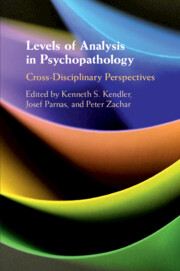Book contents
- Levels of Analysis in Psychopathology
- Advance Praise for Levels of Analysis in Psychopathology
- Levels of Analysis in Psychopathology
- Copyright page
- Contents
- Figures
- Tables
- Contributors
- Preface
- General Introduction
- Part I Neuroscience, Mechanisms, and RDoC
- Part II Phenomenology, Biological Psychology, and the Mind–Body Problem
- Part III Taxonomy, Integration, and Multiple Levels of Explanation
- Index
- References
13 - Introduction
from Section 5
Published online by Cambridge University Press: 02 April 2020
- Levels of Analysis in Psychopathology
- Advance Praise for Levels of Analysis in Psychopathology
- Levels of Analysis in Psychopathology
- Copyright page
- Contents
- Figures
- Tables
- Contributors
- Preface
- General Introduction
- Part I Neuroscience, Mechanisms, and RDoC
- Part II Phenomenology, Biological Psychology, and the Mind–Body Problem
- Part III Taxonomy, Integration, and Multiple Levels of Explanation
- Index
- References
Summary
In Chapter 14, John Campbell, a renowned analytic philosopher, is discussing the issue of mental causation and its possible replacement by neuroscientific explanatory models. What is a mental causation? In this moment, you the readers are engaged in a perceptual-motor activity by reading these lines. You probably have a desire to read this particular book and believe that you can obtain a copy from the Amazon service. You have bought the book and are now reading it either in a paperback or in a Kindle version. Your desire to read this book is most likely embedded in a wider interest in theoretical issues of psychiatry.
Information
- Type
- Chapter
- Information
- Levels of Analysis in PsychopathologyCross-Disciplinary Perspectives, pp. 171 - 172Publisher: Cambridge University PressPrint publication year: 2020
